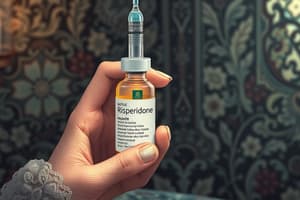Podcast
Questions and Answers
What is the trade name for the generic name Risperidone?
What is the trade name for the generic name Risperidone?
- Zyprexa
- Seroquel
- Risperdal (correct)
- Abilify
What classification does Risperidone belong to?
What classification does Risperidone belong to?
Antipsychotic (second generation)
What is the FDA category for Risperidone?
What is the FDA category for Risperidone?
C
Describe the pharmacologic properties of Risperidone.
Describe the pharmacologic properties of Risperidone.
What are the therapeutic effects of Risperidone?
What are the therapeutic effects of Risperidone?
What is the mechanism of action for Risperidone?
What is the mechanism of action for Risperidone?
What is the recommended starting dosage for Risperidone in oral therapy?
What is the recommended starting dosage for Risperidone in oral therapy?
List some side effects of Risperidone.
List some side effects of Risperidone.
Which substances may interact with Risperidone?
Which substances may interact with Risperidone?
What nursing considerations should be taken into account for Risperidone?
What nursing considerations should be taken into account for Risperidone?
What important patient teaching is recommended for those taking Risperidone?
What important patient teaching is recommended for those taking Risperidone?
Risperidone is safe to use in elderly patients with dementia.
Risperidone is safe to use in elderly patients with dementia.
Flashcards are hidden until you start studying
Study Notes
Risperidone Overview
- Generic name: Risperidone; trade name: Risperdal.
- Classification: Antipsychotic (second generation).
FDA and Pharmacological Information
- FDA Category: C (risk cannot be ruled out).
- Rapid absorption; food does not affect absorption rate.
- Plasma levels peak approximately one hour post oral administration.
- Metabolized into 9-hydroxyrisperidone, which has similar activity to Risperidone.
- Parent drug and metabolites are excreted via urine.
- Half-life is 24 hours; may be prolonged in cases of hepatic or renal impairment.
Therapeutic Indications
- Effective in reducing both positive and negative symptoms of schizophrenia.
- Cognitive function may improve; significant effects can be observed within one week.
- Exhibits antidyskinetic effects in patients with severe tardive dyskinesia (TD).
Mechanism of Action
- Binds to multiple receptors; mainly antagonizes 5-HT2 and D2 receptors.
- Therapeutic effects likely arise from antagonism at both 5-HT2 and D2.
- No blocking of cholinergic receptors, but antagonizes H1 and alpha-adrenergic receptors.
Dosage and Administration
- Available in film-coated tablets, dissolvable orally disintegrating tablets, and solution (1mg/ml).
- Initial dose typically starts at 1mg twice daily, increased to 2mg daily on the second day, and then 3mg twice daily thereafter.
- Dosage adjustments are necessary for patients with renal or hepatic impairment.
- For intramuscular administration, doses range from 25 to 50mg every two weeks.
Side Effects
- Common side effects: weight gain, diabetes, dyslipidemia, photosensitivity.
- Serious adverse effects: agitation, dizziness, somnolence, fatigue.
- Overdosing can result in sedation, difficulty concentrating, and sleep disturbances.
Drug Interactions
- Interactions noted with substances such as alcohol, carbamazepine, clonidine, and levodopa.
Nursing Considerations
- Risperidone is contraindicated in pregnancy.
- Discontinue any other antipsychotic treatments prior to initiating Risperidone.
- If treatment is restarted, adhere to initial dosing guidelines.
Patient Education
- Use dry hands to handle disintegrating tablets; do not chew them.
- Mix solution with 3 to 4 ounces of water, coffee, orange juice, or low-fat milk.
- Advise avoiding sun exposure.
- Instruct patients to report symptoms like palpitations, infections, excessive thirst or urination, and chest pain.
Black Box Warning
- Not recommended for elderly patients with dementia due to an increased risk of cardiovascular mortality.
Studying That Suits You
Use AI to generate personalized quizzes and flashcards to suit your learning preferences.



